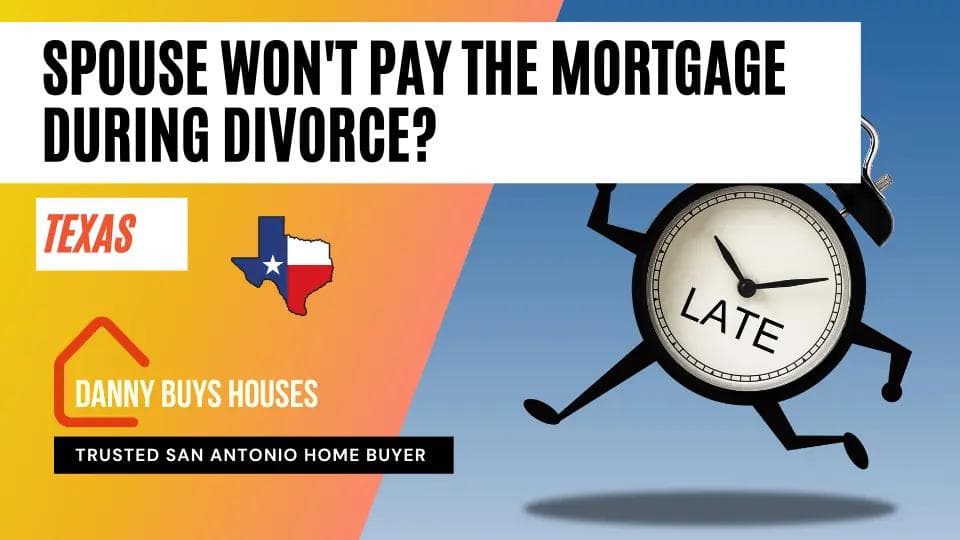
Spouse Won't Pay the Mortgage During Divorce? Here's How to Avoid Foreclosure!
By Danny Johnson | Updated 10/8/2024, 7:51:47 PM
Is your spouse stopping mortgage payments during divorce? Learn how to address this issue with a court motion and protect your property from foreclosure.
- Key Takeaways
- What If Spouse Stops Paying Mortgage During Divorce?
- Immediate Steps to Take
- Communicating with Your Mortgage Lender to Prevent Foreclosure
- Documenting Financial Strain
- Legal Options to Protect Your Home and Credit
- Strategies for Avoiding Foreclosure During Divorce Proceedings
- Negotiating with Your Spouse
- Exploring Loan Modification or Refinancing Options
- Considering a Short Sale or Deed in Lieu
- Sell to Cash Home Buyers
- The Role of Courts and Attorneys in Resolving Mortgage Disputes
- Filing Motions for Temporary Orders
- Seeking Court-Ordered Property Sale
- Importance of Legal Representation
- Conclusion
🗂 Table of Contents
Divorce can feel like a storm that sweeps away everything familiar and safe, including the roof over your head. When your spouse, now known as your ex or soon-to-be-ex, stops paying the mortgage during this tumultuous time, the threat of foreclosure looms large, casting a shadow over your future.
But take heart - you're not alone in this struggle, and there are ways to weather this financial storm.
Picture this: You're sitting at the kitchen table, bills scattered before you, wondering how to keep your home when your partner has abandoned their financial obligations. The fear of losing your house, your credit score in tatters, can be overwhelming. Yet, in this moment of crisis lies an opportunity for empowerment and financial savvy.

As someone who's navigated these choppy waters, I understand the stress you're facing as you find yourself in a situation you don't want to be in.
The good news? With the right knowledge and action plan, you can protect your home and financial future. At a minimum, you can stop the bleeding.
Let's explore how to tackle this challenge head-on, ensuring you don't become another foreclosure statistic in the wake of marital discord.
Key Takeaways
- Foreclosure is avoidable even when a spouse stops paying the mortgage payments
- Communication with lenders is crucial during divorce proceedings especially when you are financially liable
- Legal options exist to protect your home and credit score
- Courts can enforce mortgage payment responsibilities
- Refinancing after divorce can provide a clean financial slate
- Seeking legal counsel early can help navigate complex property division and ownership changes
What If Spouse Stops Paying Mortgage During Divorce?
If your spouse stops paying the mortgage during divorce, it's a big problem. In Texas, both spouses are responsible for the mortgage debt. This means you need to act fast to save your home and your credit score.
Immediate Steps to Take
Act fast if your spouse stops making mortgage payments. Call your lender to explain the situation and seek a consultation. Look for solutions together. Remember, you're both still responsible for the debt until the divorce is over.

Communicating with Your Mortgage Lender to Prevent Foreclosure
Talking to your lender is critical when you owe past due payments. They can't start foreclosure until you're 120 days late. But they must warn you 45 days before. Use this time to find ways to avoid defaulting on the loan.
Documenting Financial Strain
Keep a record of all missed payments and how your situation has affected your ability to pay. This is important for the court. If both names are on the mortgage, late payments will hurt both of your credit scores.
- Create a written agreement for payment plans
- Seek temporary court orders for payment responsibility
- Consider filing motions with the court for non-payment
According to Quicken Loans, "It’s important to provide as much factual information as necessary so your lender can get the full picture of your situation. You should include details about your income, assets and expenses. Your servicer may just need a compilation of these various documents, rather than a hardship letter. "
Remember, foreclosure takes months. You have time to look into options like loan modification or refinancing. This can help you avoid foreclosure and keep your financial health.
Legal Options to Protect Your Home and Credit
When you're having issues making payments for your mortgage during a divorce, finding legal ways to protect your money is key. A divorce lawyer can help you understand how to divide property and protect your interests.

Getting temporary agreements through court orders is a big step. These agreements can handle urgent mortgage payment and property use issues while your divorce is being sorted out. Your lawyer might ask for these orders to keep your finances stable during tough times.
It's important to know how your state divides property in a divorce. Some states split it 50/50, while others use different rules. This info can affect who gets to keep the house or how the sale money is split.
- Consult a divorce attorney for personalized advice
- Seek temporary court orders for financial protection
- Learn about your state's property division laws
- Consider options like refinancing or mortgage assumption
If keeping the house isn't possible, selling might be the only choice. You can usually sell the house in the middle of a divorce. Courts can order the house to be sold to prevent foreclosure. In complicated cases, a Special Master might be chosen to make sure both sides are treated fairly.
Don't forget to protect your credit. Close any joint accounts and start building separate credit to keep your financial future safe. With the right legal advice and planning, you can get through this tough time and protect your finances.
Strategies for Avoiding Foreclosure During Divorce Proceedings
Divorce can make money tight, risking your home. We'll look at ways to save your home and keep your credit score safe during this tough time.
Negotiating with Your Spouse
Talking openly with your spouse is key. Try to agree on mortgage payments to avoid foreclosure. Remember, both of you are on the hook for the debt if your names are on the mortgage.
Exploring Loan Modification or Refinancing Options
Loan modification can ease payment stress. Refinancing might let you take one spouse off the mortgage. Talk to your lender about these options to prevent foreclosure.
Considering a Short Sale or Deed in Lieu
If keeping the home is not possible, a short sale might help. It means selling the house for less than the mortgage. Another choice is a deed in lieu, where you give the house to the lender instead of going through foreclosure.
Sell to Cash Home Buyers
For a fast fix, think about selling a house to cash buyers. This can stop foreclosure and split the money quickly. It's good if you have a mortgage that's more than the house's value or need to sell fast.
With a cash home buyer you can sell your house as is and have it under contract and sold within a matter of weeks.
Selling what is likely your biggest marital asset can help eliminate problems where a spouse stops making mortgage payments. If the house is sold, you can split up completely from the financial responsibilities you shared jointly.
Each choice has its own benefits and drawbacks. Think about your situation well and talk to legal and financial experts. This will help you make the best choice for your future.
The Role of Courts and Attorneys in Resolving Mortgage Disputes
When couples face mortgage issues during divorce, courts and legal professionals play a crucial role. Divorce courts offer solutions to protect both parties' interests and prevent foreclosure.
Filing Motions for Temporary Orders
A family law attorney can help file motions for temporary orders in divorce court. These orders address immediate financial concerns, such as who pays the mortgage until the divorce is finalized. This step is vital to maintain stability and prevent missed payments.
Seeking Court-Ordered Property Sale
If agreements can't be reached, a court-ordered sale of the property might be necessary. This option ensures fair division of assets and helps avoid foreclosure. Legal representation is key in navigating this process effectively.
Importance of Legal Representation
Complex cases involving significant assets require skilled legal representation. A family law attorney can:
- Negotiate with lenders
- File appropriate motions
- Protect your interests throughout the divorce
Remember, going to court is often a last resort. Many couples find success in mediation or collaborative law approaches. These methods can lead to smoother resolutions of mortgage disputes without the need for lengthy court battles.
According to the law offices of Molly B. Kenny, " If you file a motion for contempt, your spouse will have to appear in front of a judge and explain why the debt isn’t paid. If your spouse has the ability to pay, the court may compel them to settle the debt or risk criminal charges."
In cases where one spouse refuses to cooperate, your attorney can file a contempt motion. This legal action can compel compliance with divorce orders regarding property division and sale. While time-consuming, it's an effective tool to ensure fair treatment in mortgage disputes.
Conclusion
Handling mortgage payments during a divorce is tough and stressful. In Florida, the law tries to keep things the same, including mortgage payments, until the divorce is settled. If you miss payments, you could face serious problems like contempt charges and even foreclosure.
The troubles caused by a spouse not making payments is a reason many consider selling their house before filing for divorce. Of course, we understand hindsight is always 20/20.
Planning your finances carefully is key during this time. Remember, not paying the mortgage can hurt both of your credit scores. Look into all your options, like talking to your spouse or considering a short sale. Getting legal advice early can protect your interests and help you understand what to do with the house after the divorce.
The foreclosure process can take over 570 days, so acting fast is crucial. Keeping your credit score safe is very important, as foreclosures and short sales can harm it for years. If you decide to keep the house, you might need to refinance to put the loan in your name.
In many cases, selling the marital home is the best choice for couples. No matter what you decide, make sure to communicate well, get professional help, and aim for a stable financial future.
If you want to sell the house fast in San Antonio, TX, contact Danny Buys Houses. We can make you an offer within 24 hours. We have helped hundreds of homeowners sell without hassle in the Lone Star State. Give us a call!

AUTHOR
Danny Johnson
Owner and Founder at Danny Buys Houses
Danny Johnson is an experienced real estate investor who has been buying houses for cash since 2003. As owner of Danny Buys Houses, Danny's goal is to help homeowners sell their house fast, regardless of the situation, so they can move on with their life.
Danny has been featured in publications such as Forbes, Realtor.com, BiggerPockets, Yahoo Finance, US News, and more. He is also the author of the book 'Flipping Houses Exposed'.




